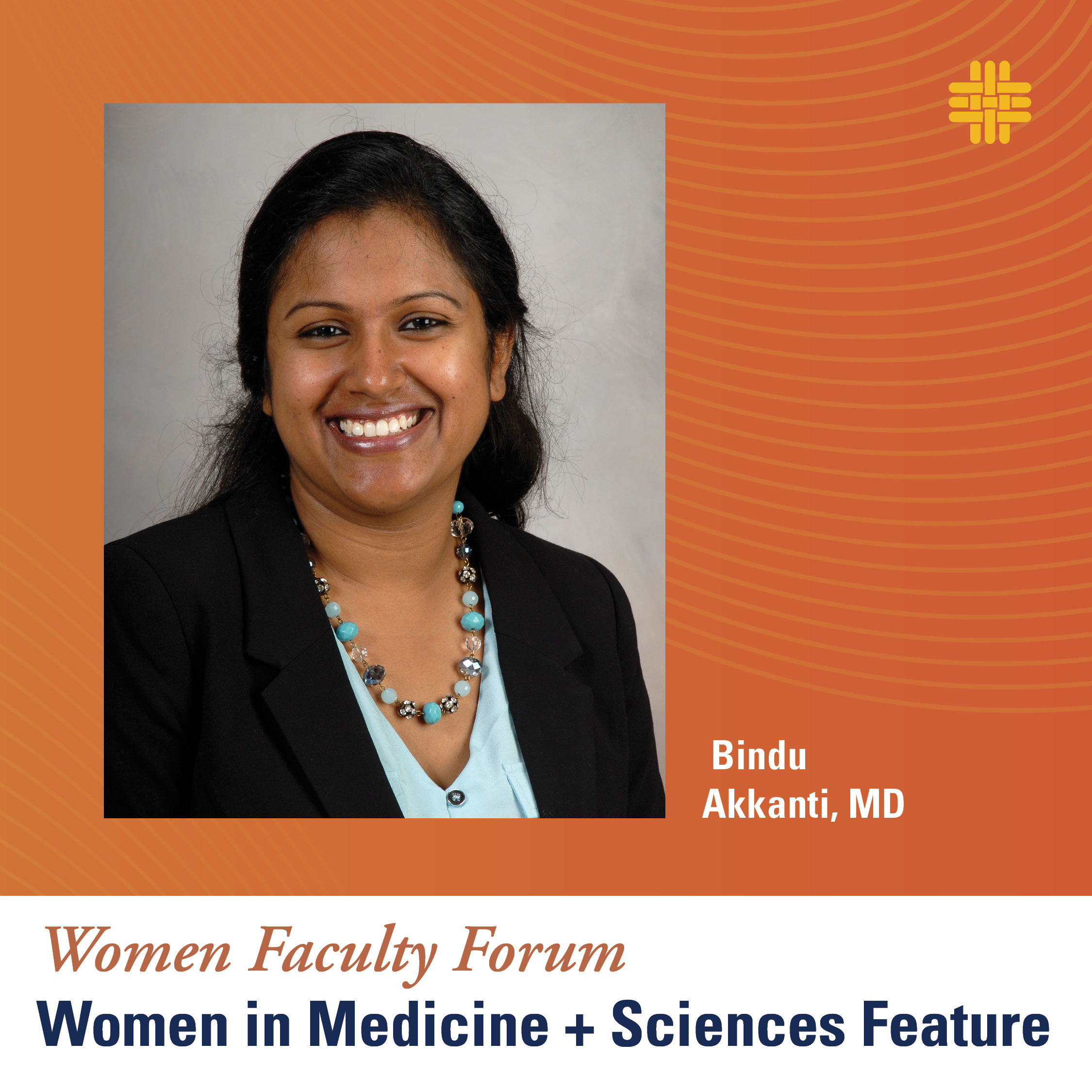Women in Medicine & Sciences Feature: Bindu Akkanti, MD

Each month, the Women Faculty Forum presents its Women in Medicine and Sciences Feature, highlighting the women faculty at McGovern Medical School who are leaders in medicine, research, and education.
This month’s feature is Bindu Akkanti, MD, associate professor and Graham Distinguished Professor in Pulmonary Medicine in the Department of Internal Medicine.
What is your background? When did you join UTHealth Houston?
I was born in Iran, raised in India, and moved to Smithville, Texas, when I was in high school. I attended UT Austin for my undergraduate studies, UT Southwestern for medical school, and Baylor University for my residency. I completed my pulmonary and critical care fellowship at Baylor College of Medicine and then spent two years in an NIH T32 fellowship in Molecular and Cellular Biology at Baylor. In 2014, I joined UTHealth Houston to aid in the growth of Thoracic Transplantation and Mechanical Circulatory Support at UTHealth Houston Heart and Vascular.
What inspired you to pursue a career in science and medicine?
I always had a deep passion for teaching, inspired by the idea of sharing knowledge and making a positive impact on others. Growing up, I was surrounded by family members who were all doctors. Their dedication to helping others and their profound knowledge fascinated me. Their stories and experiences sparked my interest in the medical field.
This realization led me to pursue a path where I could not only treat patients but also educate future generations of physicians. Becoming the first professor in both my parents’ side of the family was a proud milestone, allowing me to fulfill my dream of teaching while honoring my family’s legacy in medicine.
What are your current clinical and research interests?
My current clinical and research interests lie at the intersection of cardiovascular medicine and pulmonary critical are. Witnessing the remarkable advancements in cardiovascular medicine has inspired me to apply this knowledge to improve outcomes in pulmonary and critical care. Over the past 11 years, we have developed a robust Mechanical Circulatory Support Critical Care team, one of the first of its kind in the country.
Through my leadership roles in CHEST, ASAIO, and ELSO, I have actively worked to disseminate this knowledge and expand the base of intensive care physicians capable of caring for this unique set of patients. Pulmonary arterial hypertension (PAH) is a particularly deadly disease with no known curative therapies. I aim to leverage my understanding of severe right ventricular failure in the intensive care unit to enhance the overall outcomes for PAH patients. My goal extends beyond survival: I hope to help these patients achieve a level of normalcy where they can forget they have PAH.
I am actively collaborating with Dr. Harry Karmouty-Quintana on several translational research projects focused on understanding the mechanisms behind pulmonary vascular diseases. Through this work, I aspire to contribute meaningfully to advancing the field. I am grateful for the Graham Endowed Professorship in Pulmonary Medicine, which will allow me to expand my research mission in this area.
Who are your role models?
My role models are a diverse group who have profoundly influenced my career and approach to medicine. Firstly, I am inspired by patients who demonstrate incredible persistence and resilience in the face of illness, including my late father, a brilliant pediatrician who passed away from glioblastoma. His courage and determination remind me daily of the importance of empathy and dedication in patient care. In every patient room, I remind myself that I have to be twice the doctor, for I am doctoring for him and myself.
My past professors and current mentors, such as Dr. Biswajit Kar, Dr. Igor Gregoric, and Dr. Bela Patel, have significantly influenced me. Their unwavering commitment to advancing medical science and improving patient outcomes through exemplary leadership and clinical skills has set a high standard for excellence in the field. They have opened doors for me, for which I am forever grateful.
Additionally, the faculty of ACTAT/Heart Failure and Pulmonary/Critical Care who serve patients with impeccable clinical skills and dedication inspire me to continually strive for excellence in my practice. They are my constant moral compass as the bedside, and I am grateful for the village we have built at UTHealth Houston and in UTHealth Houston Heart and Vascular. I am committed to helping us continue to succeed.
What do you enjoy most about working at UTHealth Houston?
What I enjoy most about working at UTHealth Houston is the unique opportunity it provides for faculty to truly fulfill the mission of patient care, education, and research, and improve the lives of our patients in Texas. At UTHealth Houston, we have the resources and support to deliver exceptional patient care while advancing medical knowledge through cutting-edge research.
Additionally, the emphasis on education allows us to mentor and inspire the next generation of physicians and researchers, ensuring the continuous improvement of healthcare for the future. This holistic approach, encompassing all three pillars, makes UTHealth Houston an incredibly rewarding place to work.
How do you think UTHealth Houston can further support female faculty?
UTHealth Houston can further support female faculty by building on the strong foundation already in place. The Women Faculty Forum is an excellent platform for advocating for female faculty, providing a space for support, networking, and professional development. By continuing to foster a supportive and nurturing environment, UTHealth Houston will be able to retain talented individuals and advance our overall mission.